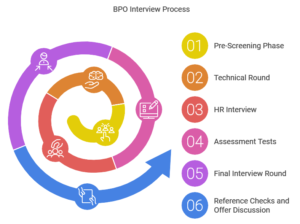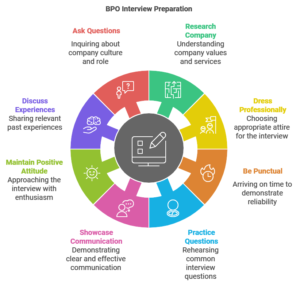Navigating the world of Business Process Outsourcing (BPO) can be challenging, especially when it comes to securing a job through the interview process. This comprehensive guide aims to provide aspiring candidates with the most current and relevant BPO interview questions and answers.
By understanding the dynamics of BPO interviews, candidates can enhance their preparation and boost their confidence.
How BPO Interviews are Conducted
The interview process for Business Process Outsourcing (BPO) positions is structured to evaluate candidates on various competencies essential for success in a fast-paced customer service environment. Understanding the typical stages of a BPO interview can help candidates prepare effectively and increase their chances of securing a position. Here’s a breakdown of how BPO interviews are usually conducted:

1. Pre-Screening Phase
The initial step in the BPO interview process often involves a pre-screening call or video interview, usually conducted by a recruiter or HR personnel. This phase aims to filter out candidates based on basic qualifications and communication skills.
- What Happens: Candidates may be asked to confirm their resume details, explain their interest in the position, and discuss their availability for the role.
- Focus Areas: During this stage, interviewers pay close attention to the candidate’s communication clarity, enthusiasm, and ability to articulate their thoughts succinctly.
2. Technical Round
After passing the pre-screening, candidates typically advance to a technical interview. This round is designed to assess the specific skills and knowledge relevant to the role they are applying for.
- What Happens: Candidates may be asked situational or scenario-based questions to evaluate their problem-solving abilities and technical competencies. They might also undergo assessments that simulate real job tasks.
- Focus Areas: Interviewers will look for evidence of analytical thinking, proficiency with relevant tools, and the ability to manage customer interactions effectively. For example, candidates might be presented with a common customer issue and asked how they would resolve it.
3. HR Interview
The HR interview is another crucial stage, focusing more on behavioral and cultural fit within the organization.
- What Happens: This round typically involves questions about the candidate’s work ethic, teamwork, and how they handle workplace challenges. The interviewer may also talk about the company’s ethics and values.
- Focus Areas: Here, interviewers assess candidates’ soft skills, such as emotional intelligence, adaptability, and their ability to work collaboratively. They might ask questions like, “Describe a time when you had to work with a difficult team member” to evaluate interpersonal skills.
4. Assessment Tests
Many BPO companies incorporate assessment tests at some point in the interview process. These tests can vary widely depending on the specific job requirements.
- What Happens: Candidates may be asked to complete language proficiency tests, aptitude assessments, or situational judgment tests to gauge their suitability for the role.
- Focus Areas: Tests often assess a candidate’s ability to understand and follow instructions, communicate effectively, and make decisions under pressure.
5. Final Interview Round
For some organizations, a final interview may be conducted, often by higher management or team leaders.
- What Happens: This interview may involve more in-depth discussions about the candidate’s previous experiences and how they align with the company’s future goals.
- Focus Areas: Interviewers will assess the candidate’s long-term interest in the company and their potential contributions to team dynamics and organizational objectives.
6. Reference Checks and Offer Discussion
After a successful interview process, companies typically conduct reference checks to verify the candidate’s previous employment and work performance.
- What Happens: Once references are confirmed, candidates may receive a job offer, which includes details about salary, benefits, and working conditions.
- Focus Areas: This stage is crucial as it solidifies the candidate’s fit within the company and helps the employer make informed decisions based on past performance.
Also read: How To Find A Job? Try These 5 Proven Ways
Things to Consider While Giving a BPO Interview
Preparing for a BPO interview involves more than just understanding common BPO interview questions and answers. Candidates should also consider various factors that can significantly impact their performance and overall impression. Here are essential things to keep in mind while giving a BPO interview:

1. Research the Company Thoroughly
Before the interview, research the company and its services. Understanding the organization’s mission, values, and culture is crucial.
- What to Look For: Familiarise yourself with the company’s history, client base, and specific BPO services it offers. Look for recent news articles or press releases that highlight the company’s achievements or changes.
- Why It Matters: Demonstrating knowledge about the company shows that you are genuinely interested and can help you tailor your answers to align with the company’s goals.
2. Dress Professionally
First impressions are crucial in any interview setting, and BPO interviews are no exception.
- Dress Code: Depending on the company’s culture, opt for business casual or formal attire. For instance, a button-up shirt and slacks are generally safe choices.
- Why It Matters: Dressing appropriately conveys professionalism and respect for the interview process. It can help boost your confidence as you enter the interview.
3. Be Punctual
Arriving on time is a fundamental aspect of professionalism.
- Plan Ahead: Try reaching at least 10-15 minutes early. If it’s a virtual interview, ensure your technology is set up and tested in advance.
- Why It Matters: Punctuality reflects your reliability and commitment. Being late can create a negative first impression and may lead the interviewer to question your time management skills.
4. Practice Common Interview Questions and Answers
Familiarise yourself with common BPO interview questions and answers to enhance your confidence.
- Mock Interviews: Conduct practice interviews with a friend or mentor to simulate the real experience. Focus on articulating your answers clearly and concisely.
- Why It Matters: Practicing helps you refine your responses and reduces anxiety. It allows you to present your qualifications more effectively during the actual interview.
5. Showcase Effective Communication Skills
Strong communication is critical in BPO roles, where customer interaction is a daily task.
- Be Clear and Concise: Use straightforward language, and avoid jargon unless necessary. Make sure your answers are structured logically.
- Why It Matters: Demonstrating clear communication helps reassure the interviewer of your ability to interact with clients effectively and handle inquiries professionally.
6. Maintain a Positive Attitude
A positive demeanor can leave a lasting impression.
- Stay Enthusiastic: Approach the interview with enthusiasm and a smile. Even if you face challenging questions, maintain a composed and positive attitude.
- Why It Matters: A positive attitude signals to the interviewer that you are resilient and can handle the pressures of a BPO environment, which often involves dealing with difficult customers.
7. Be Prepared to Discuss Your Experiences
Be ready to share specific examples from your past experiences that demonstrate your qualifications.
- Use the STAR Method: Structure your responses using the Situation, Task, Action, and Result framework to provide clear and impactful answers.
- Why It Matters: Real-world examples help illustrate your problem-solving abilities and show how you’ve successfully managed challenges in the past.
8. Ask Insightful Questions
Be aware of questions to ask the interviewer at the end of the interview.
- What to Ask: Consider questions about the company culture, team dynamics, or opportunities for professional development. For example, “How is the working culture of this company different from that of another ?”
- Why It Matters: Asking questions shows your genuine interest in the position and helps you assess if the company aligns with your career goals.
9. Stay Calm and Composed
It’s natural to feel nervous, but maintaining your composure is essential.
- Breathing Techniques: To help calm your nerves before the interview, practice deep breathing exercises. Also, take a moment to pause before answering questions.
- Why It Matters: Staying calm enables you to think clearly and respond thoughtfully, which can positively impact your performance.
10. Follow Up After the Interview
After the interview, consider sending an appreciation email to express your gratitude for the opportunity.
- What to Include: Thank the interviewer for their time, reiterate your interest in the position, and briefly mention a key point from the interview that resonated with you.
- Why It Matters: A follow-up note reinforces your interest in the role and demonstrates your professionalism, leaving a positive impression.
General BPO Interview Questions and Answers

1. Tell me about yourself.
- What the Interviewer is Expecting: A concise summary of your background, skills, and career goals.
- Sample Answer: “I am a recent graduate with a Bachelor of Commerce with a strong interest in customer service. I have completed internships in both sales and support roles, where I honed my communication and problem-solving skills. My goal is to leverage these experiences to excel in a BPO environment.”
2. Why do you want to work in the BPO sector?
- What the Interviewer is Expecting: Genuine interest in the industry and an understanding of its dynamics.
- Sample Answer: “I am drawn to the BPO sector because of its dynamic nature and the opportunity it provides to interact with diverse clients. I enjoy helping people, and I believe that working in BPO allows me to use my skills to make a positive impact.”
3. Describe a challenging situation you faced at work and how you dealt with it.
- What the Interviewer is Expecting: Problem-solving skills and resilience.
- Sample Answer: “In my previous role as a customer service representative during the holiday season, we faced a surge of customer complaints about delayed shipments due to unexpected supply chain issues. To address this, I calmly listened to each customer’s concerns and provided updates about their orders. I also collaborated with my supervisor to send out proactive emails to all affected customers, explaining the situation and offering compensation for the inconvenience.
4. How do you handle stress and pressure?
- What the Interviewer is Expecting: Ability to manage stress effectively.
- Sample Answer: “I handle stress and pressure by employing a few effective strategies that help me stay focused and productive. First, I prioritize my tasks to ensure I’m addressing the most urgent issues first. By breaking down my workload into manageable steps, I can tackle challenges one at a time without feeling overwhelmed. Additionally, I practice deep breathing exercises to stay calm during high-pressure situations.”
5. What are your strengths and weaknesses?
- What the Interviewer is Expecting: Self-awareness and honesty.
- Sample Answer: “My strength is my attention to detail, which helps in quality assurance. A weakness is my tendency to overthink decisions, but I am working on becoming more decisive.”
6. How do you prioritize tasks when you have multiple deadlines?
- What the Interviewer is Expecting: Time management skills.
- Sample Answer: When faced with multiple deadlines, I prioritize tasks by assessing their urgency and importance. I start by listing all my tasks and identifying which ones have the closest deadlines or the greatest impact on our team’s goals. I use a prioritization method to categorize tasks into four quadrants: urgent and important, important but not urgent, urgent but not important, and neither urgent nor important. This helps me focus on high-priority tasks first.
7. Can you provide an example of excellent customer service you delivered?
- What the Interviewer is Expecting: Understanding of customer service principles.
- Sample Answer: “At my last job, I received a complaint about a delayed order. I took the initiative to follow up with the supplier and kept the customer informed until the issue was resolved.”
8. What do you know about the BPO industry?
- What the Interviewer is Expecting: Knowledge of industry trends and operations.
- Sample Answer: “The BPO industry is rapidly evolving with advancements in technology like AI and automation, enhancing efficiency and service delivery.”
9. How do you stay updated with industry trends?
- What the Interviewer is Expecting: Commitment to continuous learning.
- Sample Answer: “I subscribe to industry newsletters and follow relevant blogs and forums to stay informed about new developments.”
10. What is your availability to work in shifts?
- What the Interviewer is Expecting: Flexibility and willingness to adapt.
- Sample Answer: “I am flexible with my schedule and can work in shifts as needed to meet the demands of the job.”
BPO Interview Questions and Answers Based on Education/Qualification
1. How has your education prepared you for a role in BPO?
-
- What the Interviewer is Expecting: Insights into how your academic background is relevant to the job.
- Sample Answer: “My degree in Communications has equipped me with strong verbal and written skills essential for effective customer interactions in BPO roles.”
2. What specific skills from your coursework can you apply in this role?
- What the Interviewer is Expecting: Application of theoretical knowledge to practical scenarios.
- Sample Answer: “Courses in conflict resolution and customer behavior have taught me how to handle difficult situations calmly, which is vital in a BPO setting.”
3. Can you discuss any projects related to customer service that you undertook during your studies?
- What the Interviewer is Expecting: Practical experience related to customer interaction.
- Sample Answer: “In my final year, I worked on a project analyzing customer feedback for a local business. This involved gathering data, identifying pain points, and suggesting improvements.”
4. What skills did you gain from internships or part-time jobs?
- What the Interviewer is Expecting: Real-world application of skills learned.
- Sample Answer: “My internship in retail taught me valuable sales and customer service skills, including active listening and conflict resolution.”
5. How do your qualifications align with our job requirements?
- What the Interviewer is Expecting: Direct correlation between your background and the job role.
- Sample Answer: “My coursework in customer service management aligns well with your requirement for someone who can manage customer relationships effectively.”
6. Are you willing to undergo further training if required?
- What the Interviewer is Expecting: Openness to learning and development.
- Sample Answer: “Absolutely! I believe continuous training is essential in the BPO industry to keep up with evolving standards and technologies.”
7. What languages do you speak, and how fluent are you?
- What the Interviewer is Expecting: Language proficiency relevant to the role.
- Sample Answer: “I am fluent in English and Spanish, which allows me to communicate with a diverse clientele effectively.”
8. How do you approach learning new software or tools?
- What the Interviewer is Expecting: Willingness and ability to adapt to new technologies.
- Sample Answer: “I usually start with tutorials and hands-on practice. I find that engaging with the software directly helps me learn quickly.”
9. How did you perform in relevant subjects during your studies?
- What the Interviewer is Expecting: Academic performance indicating competency.
- Sample Answer: “I excelled in courses related to customer relationship management and marketing, achieving top marks and practical skills that are crucial for this role.”
10. What extracurricular activities have you participated in that relate to customer service?
- What the Interviewer is Expecting: Demonstrated interest and experience outside formal education.
- Sample Answer: “I volunteered for a local nonprofit, helping manage customer inquiries and organize events, which enhanced my communication skills.”
BPO Interview Questions and Answers Based on Organization/Company
1. What do you know about our company?
-
- What the Interviewer is Expecting: Research on the company’s mission, values, and services.
- Sample Answer: “I understand that your company specializes in providing end-to-end customer support solutions and prides itself on a strong commitment to client satisfaction, which aligns with my own values.”
2. Why do you think you would be a good fit for our team?
-
- What the Interviewer is Expecting: Self-awareness and alignment with company culture.
- Sample Answer: “I believe my proactive approach and dedication to continuous improvement resonate with your team’s values. I thrive in collaborative environments and am eager to contribute to your success.”
3. How do you handle feedback from supervisors?
-
- What the Interviewer is Expecting: Openness to constructive criticism and a willingness to improve.
- Sample Answer: “I view feedback as a vital tool for personal and professional growth. I always take notes during feedback sessions and actively work on suggestions provided.”
4. What attracted you to our company?
-
- What the Interviewer is Expecting: Genuine interest in the organization.
- Sample Answer: “I admire your commitment to employee development and community outreach, and I want to be part of a company that values both its clients and its team members.”
5. How would you represent our company’s values to clients?
-
- What the Interviewer is Expecting: Understanding of company values and how to embody them.
- Sample Answer: “I would ensure to communicate with empathy and professionalism, showing clients that we prioritize their needs and satisfaction.”
6. What challenges do you foresee in this role?
-
- What the Interviewer is Expecting: Critical thinking and awareness of potential obstacles.
- Sample Answer: “I anticipate challenges in managing diverse customer expectations, but I believe strong communication and problem-solving skills can help overcome these.”
7. How do you align your personal goals with the company’s objectives?
-
- What the Interviewer is Expecting: Understanding of mutual benefit between employee and employer.
- Sample Answer: “My goal is to develop my customer service skills while contributing to the company’s mission of delivering exceptional support to clients.”
8. What is your understanding of the services we provide?
-
- What the Interviewer is Expecting: Familiarity with the company’s offerings.
- Sample Answer: “Your company provides comprehensive customer support services, including technical assistance and customer engagement solutions, which I find crucial for enhancing customer satisfaction.”
9. How would you handle a dissatisfied customer on behalf of our company?
-
- What the Interviewer is Expecting: Problem-solving abilities and customer service skills.
- Sample Answer: “I would listen to the customer’s concerns, empathize with their situation, and work on providing a suitable solution while keeping them informed throughout the process.”
10. What do you think sets us apart from our competitors?
-
- What the Interviewer is Expecting: Knowledge of the competitive landscape.
- Sample Answer: “Your company’s emphasis on personalized customer experiences and continuous improvement sets you apart, as you genuinely focus on understanding and addressing client needs.”
FAQs: BPO Interview Questions and Answers
What is a BPO interview like?
BPO interviews are typically structured, involving multiple rounds that assess both technical skills and cultural fit.
How can I prepare for BPO interview questions?
Research the company, practice common questions, and understand the skills required for the role.
What skills are essential for a BPO job?
Key skills include communication, problem-solving, adaptability, and teamwork.
Are there specific qualifications required for BPO roles?
While many BPO jobs require a high school diploma, a degree and relevant experience can enhance your candidacy.
